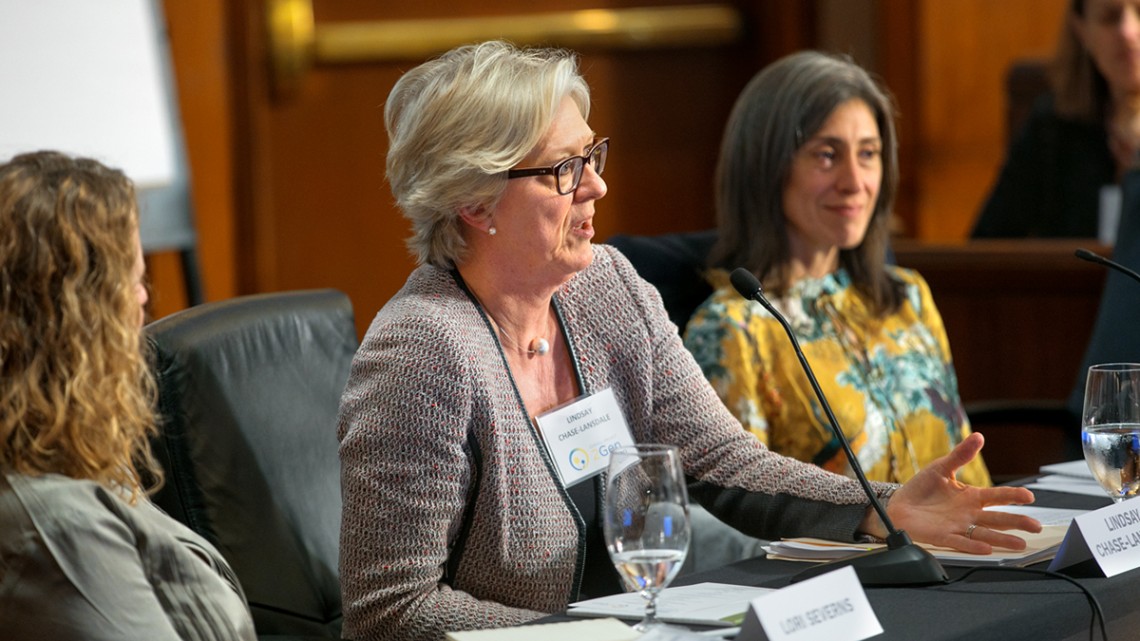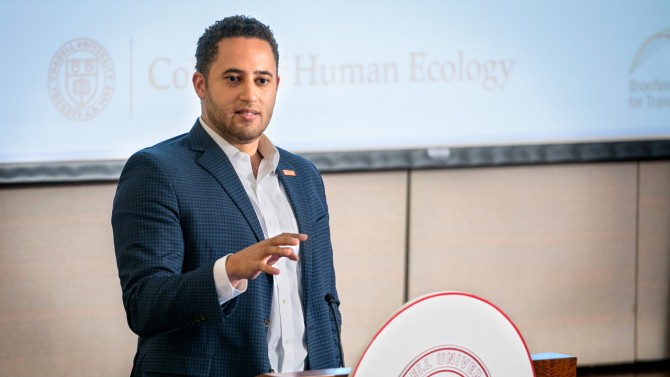
Lindsay Chase-Lansdale, the Frances Willard Professor of Human Development and Social Policy at Northwestern University, speaks at the Oct. 23 symposium on Disrupting the Cycle of Poverty: Two-Generation Approaches from Research, Practice and Policy.
New initiative launched to support vulnerable families
By Stephen D'Angelo
At an Oct. 23 symposium, Cornell researchers launched a new Bronfenbrenner Center for Translational Research initiative: Cornell Project 2Gen, a project that leverages cutting-edge approaches to support vulnerable families and disrupt the intergenerational cycle of poverty.
Project 2Gen, led by co-directors Laura Tach and Rachel Dunifon of the College of Human Ecology’s Department of Policy Analysis and Management, focuses on addressing the needs of at-risk children and their parents to capitalize on the strong connection between parents’ well-being and children’s healthy development.
“Project 2Gen takes a two-generational approach to addressing the needs of vulnerable families by supporting research and programs that consider both parents and children,” Dunifon said. “And so the two-gen approach acknowledges that parents’ well-being and children’s well-being are intertwined, and that we really can’t address one without the other.”
According to Dunifon, the project reflects the mission of the College of Human Ecology, which combines that of a land-grant institution and an Ivy League university. Through this focus, the project aims to build a vibrant research community and outreach network.
“Project 2Gen is going to be a hub of innovative work that brings together research, practitioners and policymakers, developing and carrying out work in this area, testing new approaches, evaluating their effectiveness, and implementing them locally and throughout the state,” Dunifon said.
The approach is gaining momentum because research documents a strong connection between parents’ economic, psychological and social well-being and children’s healthy development.
The project, which will leverage collaboration between the work of students and faculty members across Cornell, is developing partnerships with community, state and national organizations and government agencies to support parents and children simultaneously.
Within this approach, there are several methods researchers and practitioners can use. Some two-generational programs begin by focusing on children and then add a component to support parents, such as parent education or skills classes. Others may focus on parents, then add a component for children, such as child care or nutrition support. Still other approaches target systems that influence families, such as schools or workplaces.
The Oct. 23 symposium included a panel of experts focused on the topic Disrupting the Cycle of Poverty: Two-Generation Approaches from Research, Practice and Policy. Panelists were Lindsay Chase-Lansdale, the Frances Willard Professor of Human Development and Social Policy at Northwestern University; Lisa Gennetian, research professor at the Institute for Human Development and Social Change, New York University; Svante Myrick ’09, mayor of Ithaca; and Lori Severens, assistant director at Ascend at the Aspen Institute.
“I want to say thank you for the work you do,” said Myrick, who as a youth took part in the Head Start program, which promotes the school readiness of young children from low-income families through agencies in their local community. “My siblings and I all had an opportunity to start working at age 16, and we were all able to be successful because of the work that you’ve done, the research that you’ve done, to prove that this isn’t only the big-hearted thing to do, but the hard-headed thing to do.”
Stephen D’Angelo is assistant director of communications at the College of Human Ecology.
Media Contact
Get Cornell news delivered right to your inbox.
Subscribe